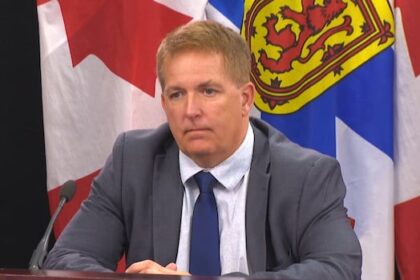ManitobaPublic employees in a northern Manitoba First Nation have been given mandatory drug tests, which the community’s chief says is part of an effort to connect residents with addictions resources amid an escalation in illegal drug activity.’We’re doing this for everybody to be safe — not just one organization … but in all the community,’ says chiefAn aerial shot of Wasagamack First Nation in October 2024. Public employees working for the First Nation were required to take drug tests this month, as part of efforts to address drug use in the community. (Tyson Koschik/CBC)Public employees in a northern Manitoba First Nation have been given mandatory drug tests, which the community’s chief says is part of an effort to connect residents with addictions resources amid an escalation in illegal drug activity.”We’re doing this for everybody to be safe — not just one organization … but in all the community,” Wasagamack First Nation Chief Walter Harper told CBC News.”We’re not trying to label anybody, we are not trying to offend anybody, but this is an ongoing issue.”Wasagamack and three neighbouring First Nations in the Island Lake region in northeastern Manitoba — St. Theresa Point, Garden Hill and Red Sucker Lake — have seen an increase of drug activity in recent years, according to Anisininew Okimawin, a coalition representing the four communities in the region, about 470 kilometres northeast of Winnipeg.Wasagamack is the first community in the region to ask its public employees to undergo testing to detect cocaine, methamphetamine and other substances, said Harper, who was among the people tested.Wasagamack Chief Walter Harper also underwent the drug testing ordered for all public employees working in the First Nation on Sept. 8. He says the testing was done to help connect with residents who might be using drugs with substance abuse prevention services. (Submitted by Walter Harper)The tests, conducted on Sept. 8 and 9, were mostly intended as an opportunity to connect with residents who might have recently used drugs and offer them help with substance abuse prevention or addiction treatment options, the chief said.Limited health resources in Wasagamack have complicated addictions treatment, meaning it’s easier to help people deal with substance abuse or stay clean at the early stages, said Harper.”Not everybody is an addict.… There’s only some, but we needed to step forward.”Harper said the testing has been planned for a year but kept being pushed back, until concerns resurfaced last month about the risks workers under the influence of drugs could pose to themselves or the public while operating machinery or taking care of others.Public employees refusing the test would be suspended without pay for three months, according to a notice posted online.No one refused to be tested, but about 10 employees advised the band council their results might turn up positive for certain substances, said Harper.The idea of pairing the testing with recovery support is key to helping address some of the issues that push people to using drugs, and is a welcome strategy, says one nurse and social worker.”If leadership decided to do the testing with a punitive approach attached to it, there’s nothing to gain,” said Dawn Milne, director of Wasagamack Anisininew Urban Prevention — an organization that offers wraparound services to Wasagamack residents in Winnipeg.”Trauma is the real source of the drug problem,” she said. “We need more resources towards mental health.”Testing alone won’t be enough to reduce the flow of drugs into Wasagamack, said Milne, but repeated testing will keep attention on the problem. Paired with support, it also sends a message that can discourage people from drug use over time, she said.While there are no formal plans to repeat the mandatory testing, Harper didn’t dismiss the possibility of ordering another round in the coming months.Scans, canine patrolsSt. Theresa Point First Nation is planning to roll out voluntary drug testing in October. Chief Raymond Flett told CBC News it will come a few weeks into the rollout of a canine unit patrol program intended to help detect drugs.”We just need to slow it down,” he said, referring to the influx of drugs in St. Theresa Point. “We want to keep our families safe.”The community is also planning to add body scanners to find and seize drugs at its airport, one of the main access points to the Island Lake region.Alex McDougall, the acting grand chief of Anisininew Okimawin, said drug activity has increased in the region, with groups, including suspected gangs, working together to transport illegal substances among the communities.Alex McDougall, the acting grand chief of Anisininew Okimawin, fears efforts to address drug activity in the Island Lake region won’t work without a centralized plan. (Felisha Adam/CBC)”Predators that are in large urban centres are making contact with our community members,” McDougall said. “It’s coming at the expense of our young people.”First Nations safety officers patrolling the four Anisininew Okimawin communities are “turning over drugs to us on a regular basis,” Island Lake RCMP said in a statement to CBC.However, “no arrests are being made in relation to these seizures as they are not RCMP investigations,” the statement said.Anisininew Okimawin has been working on addictions recovery including with the opening of a rapid access to addictions medicine, or RAAM, clinic for people from the Island Lake area in Winnipeg last April.But McDougall is concerned the efforts taken so far won’t be enough to curb drug use, and said he would like to see the province provide more financial support to create a centralized plan for the region.”One community has prevention efforts, but it is defeated if the other communities aren’t following,” he said.A spokesperson for provincial Addictions Minister Bernadette Smith said the province has taken steps to crack down on drug traffickers, pointing to measures like an anti-drug smuggling pilot project in Manto Sipi Cree Nation.The government has also launched digital access to addictions medicine services to connect residents in recovery with health-care workers throughout the province, the statement said.ABOUT THE AUTHORSantiago Arias Orozco is a journalist with CBC Manitoba currently based in Winnipeg. He previously worked for CBC Toronto and the Toronto Star. You can reach him at santiago.arias.orozco@cbc.ca.
Wednesday, 4 Mar 2026
Canada – The Illusion
Search
Have an existing account?
Sign In
© 2022 Foxiz News Network. Ruby Design Company. All Rights Reserved.
You May also Like
- More News:
- history
- Standing Bear Network
- John Gonzalez
- ᐊᔭᐦᑊ ayahp — It happened
- Creation
- Beneath the Water
- Olympic gold medal
- Jim Thorpe
- type O blood
- the bringer of life
- Raven
- Wás’agi
- NoiseCat
- 'Sugarcane'
- The rivers still sing
- ᑲᓂᐸᐏᐟ ᒪᐢᑿ
- ᐅᑳᐤ okâw — We remember
- ᐊᓂᓈᐯᐃᐧᐣ aninâpêwin — Truth
- This is what it means to be human.
- Nokoma











